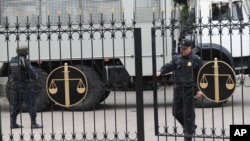A Russian court has handed down sentences ranging from six to 18 years to a group of young leftist activists accused of running an underground “anarchist terrorist” network — the latest chapter in a controversial case marred by allegations that evidence was fabricated or gained through torture by the country’s federal security services.
According to Monday's ruling, handed down in the regional city of Penza, the seven defendants — most of them in their 20’s — were planning terrorist acts amid the 2018 presidential elections and World Cup as part of an anarchist group called “the Network,” or "Set" in Russian.
Members were also convicted on additional charges of weapons and drug possession.
Another alleged member of the group, Igor Shishkin, was given a three-and-a-half-year sentence in January 2019 after agreeing to cooperate with investigators in a plea deal.
Several others still face charges in parallel trials unfolding in Moscow and St. Petersburg.
Yet nearly all the young men say they were tortured into confessions by Federal Security Service (FSB) agents while in custody.
From the outset, Mediazona, Russia’s leading independent prison news website, published in-depth and graphic accounts of the prisoners’ descriptions of being repeatedly administered electric shocks by FSB agents.
"Understand, FSB officers always reach their goals,” said Viktor Filinkov, describing his first days of torture at the hands of FSB agents in a piece first published with the website.
"From a box, they brought out two cables,” alleged Arman Sagynbayev, another one of the defendants, in a subsequent article describing his time in detention.
Yet prosecutors refused to investigate the torture allegations — in one case, arguing the FSB's use of electroshock on a defendant was justified.
In another, authorities explained away marks left on the body of another defendant as the result of bedbugs.
Critics also raised concerns that evidence in the case was fabricated, or taken out of context.
The prosecution, for example, pointed to the defendants' love of "Strikeball" — a military tactical role play game using pellet guns and fake grenades — as evidence of the group preparing to carry out a terrorist attack.
Authorities placed the group on the government’s list of terrorist organizations in 2019, although critics of the case argue FSB agents themselves fashioned the name Set to inspire fear.
Outside the courtroom, news of the ruling was met with chants of "shame" by the defendants' families and supporters.
Meanwhile, on social media, users expressed outrage over what many felt was a preordained conviction and punishment for non-conventional political views.
Many of the men identified with "antifa" — a global anti-fascist movement — but were also active in ecological and animal rights activities.
Adding to critics' sense that the fate of the young men was predetermined: the court’s findings matched the prosecution requests for punishment without exception. “
This is the day when "the system" convicted our children for 86 years!” wrote Alla Frolova, head of OVD-Info, a volunteer human rights group that provides legal assistance, in referring to the sum of years meted out by the court.
"These 86 years are canceled out of the lives of these young people, their families and friends,” added Frolova. “
These very young people’s testimony about an imaginary terrorist organization were beaten out using torture,” wrote opposition leader Alexey Navalny in a post to Twitter. “Any minister in the Russian government is 10 times more of a criminal and a threat to society than these guys.”
Kremlin spokesman Dmitry Peskov argued the government had no right to intervene with prosecutors.
“The president more than once looking into this situation, and more than once ordered that everything be carried out according to the law,” said Peskov, during his daily briefing with journalists.




